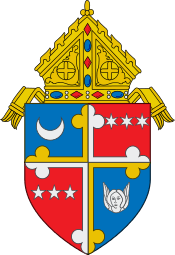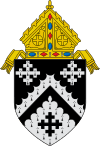James Aloysius Hickey
James Aloysius Hickey (October 11, 1920 – October 24, 2004) was an American Cardinal of the Roman Catholic Church. He served as Archbishop of Washington from 1980 to 2000, and was elevated to the cardinalate in 1988.
James Aloysius Hickey | |
|---|---|
| Cardinal, Archbishop emeritus of Washington | |
 | |
| Church | Roman Catholic Church |
| Diocese | Washington (emeritus) |
| See | Washington (emeritus) |
| Appointed | June 17, 1980 |
| Installed | August 5, 1980 |
| Term ended | November 21, 2000 |
| Predecessor | William Baum |
| Successor | Theodore Edgar McCarrick |
| Other posts | Cardinal Priest of Santa Maria Madre del Redentore a Tor Bella Monaca |
| Orders | |
| Ordination | June 15, 1946 by William Murphy |
| Consecration | April 14, 1967 by John Francis Dearden |
| Created cardinal | June 28, 1988 by John Paul II |
| Rank | Cardinal-Priest |
| Personal details | |
| Born | October 11, 1920 Midland, Michigan |
| Died | October 24, 2004 (aged 84) Washington, D.C. |
| Buried | Cathedral of St. Matthew the Apostle |
| Previous post |
|
| Motto | VERITATEM IN CARITATE (TRUTH IN CHARITY) |
| Coat of arms |  |
| Styles of James Hickey | |
|---|---|
 | |
| Reference style | His Eminence |
| Spoken style | Your Eminence |
| Informal style | Cardinal |
| See | Washington |
Ordination history of James Aloysius Hickey | |||||||||||||||||||||||||
|---|---|---|---|---|---|---|---|---|---|---|---|---|---|---|---|---|---|---|---|---|---|---|---|---|---|
| |||||||||||||||||||||||||
| |||||||||||||||||||||||||
Early life and ministry
James Hickey was born in Midland, Michigan, to James and Agnes (née Ryan) Hickey; he had an older sister, Marie.[1] His father was a dentist who, during the Great Depression, treated patients who could not pay for their dental care.[2] At age 13, he entered St. Joseph Minor Seminary in Grand Rapids.[1] He graduated as valedictorian from Sacred Heart Major Seminary in Detroit in 1942,[1] also providing pastoral care to migrant workers during his studies.[3] He then attended The Catholic University of America in Washington, D.C. Hickey was ordained to the priesthood by Bishop William Murphy on June 15, 1946.[2]
He then served as an associate pastor at St. Joseph's Church in Saginaw until 1947,[3] whence he went to Rome to further his studies. He earned a doctorate in canon law from the Pontifical Lateran University in 1950, and a doctorate in theology from the Pontifical University of St. Thomas Aquinas (Angelicum) in 1951.[3] Upon returning to the United States, he served as secretary to Bishop Stephen Stanislaus Woznicki from 1951 to 1966.[2] He was also the founding rector of St. Paul Seminary, which was later closed in 1970. From 1962 to 1965, he attended the Second Vatican Council as a peritus for Bishop Woznicki.[2] He was raised to the rank of Domestic Prelate of His Holiness on October 31, 1963.[2]
Episcopal career
On February 18, 1967, Hickey was appointed Auxiliary Bishop of Saginaw and Titular Bishop of Taraqua by Pope Paul VI.[4] He received his episcopal consecration on the following April 14 from Archbishop John Francis Dearden, with Bishops Woznicki and Stephen Aloysius Leven serving as co-consecrators, at the Cathedral of St. Mary.[4] He selected as his episcopal motto: Veritatem In Caritate, meaning, "Truth in Charity" (Ephesians 4:15).[5]
Hickey served as Chairman of Priestly Formation within the United States Conference of Catholic Bishops from 1968 to 1969.[3] In March 1969, he became rector of the Pontifical North American College in Rome, where he would oversee the formation of American seminarians for the next five years.[2]
Bishop of Cleveland
Hickey was later named the eighth Bishop of Cleveland, Ohio, on May 31, 1974.[2] Replacing Bishop Clarence George Issenmann, he was formally installed on July 16 of that year.[4] During his tenure in Cleveland, he was a leading advocate of racial unity and became active in justice issues involving El Salvador.[3] In 1980, he traveled to El Salvador to attend the funeral of the slain Archbishop Óscar Romero.[3] Sister Dorothy Kazel and Jean Donovan, two women whom Hickey had commissioned to serve as missionaries in El Salvador were later murdered; he kept their photographs on the wall of his private chapel for the rest of his life.[3]
Archbishop of Washington
Pope John Paul II promoted Hickey to Archbishop of Washington, D.C. on June 17, 1980. During the 1980s, he lobbied members of the United States Congress to stop sending aid to the Contras in Nicaragua, and pushed his fellow bishops to take strong stands against increased military spending and in favor of nuclear disarmament. He was one of the first American bishops to address the issue of sexual abuse by clergy, which would become a nationwide scandal in 2002.[1]
During the Salvadoran Civil War, Hickey opposed the Reagan administration's support for the military government of El Salvador.[6] In 1981, the Archbishop told the House Subcommittee on Inter-American Affairs: "Our position is to oppose military aid and intervention from all outside powers."[6] He feared a Communist takeover in El Salvador but opposed sending military assistance, believing such weapons would strengthen repressive elements in security forces.[6] In 1983, he was dispatched by John Paul II on an apostolic visitation to investigate liturgical abuses in the Archdiocese of Seattle, then led by Raymond Hunthausen.[7] Commenting on the visitation, Hickey said, "It wasn't easy, you know."[7]
John Paul II created Hickey Cardinal Priest of Santa Maria Madre del Redentore a Tor Bella Monaca in the consistory of June 28, 1988. Hickey was, at that point, one of thirteen Americans in the College of Cardinals. That same year, he was invited to lead a retreat for the pope and his household.[1] Within the United States Conference of Catholic Bishops, he served as Chairman of the Committee on Doctrine (1979–81), of the Committee on Human Values (1984–1987), and of the Committee on the Pontifical North American College (1989–1991; 1994–1997).[3]
His tenure in Washington oversaw a significant expansion of Catholic Charities, which became the region's largest private social service agency, and the establishment of the Archdiocesan Health Care Network; Archdiocesan Legal Network, which provide millions of dollars in pro bono care for the region's low income residents; Birthing and Care, which provides pre-natal, delivery and post-natal medical care to women in financial need; Faith in the City, an initiative designed to revitalize inner-city Catholic schools; Victory Housing, which develops assisted and independent living for senior citizens.[3] In conjunction with Mother Teresa, the Archbishop also founded a Washington convent of the Missionaries of Charity for the care of the homeless and terminally ill.[3] He once declared, "We serve the homeless not because they are Catholic, but because we are Catholic. If we don't care for the sick, educate the young, care for the homeless, then we cannot call ourselves the church of Jesus Christ."[1]
Hickey resigned as archbishop on November 21, 2000, after twenty years of service.[4]
Views
In addition to his social activism, Hickey was known for his orthodox views regarding Church doctrine.
Gay ministries
He ordered New Ways Ministry, an unapproved ministry for gay and lesbian Catholics which rejects the Church's teaching on homosexuality, to cease operations in the Washington archdiocese in the early 1980s, and forced Georgetown University to stop Dignity, another organization for gays and lesbians, from having Masses on the campus in 1987.[1]
Liturgical abuses
He also complained about liturgical abuses at Holy Trinity Church in Georgetown, even sending auxiliary bishop William E. Lori to investigate the Jesuit-run parish.[8]
Contraception and abortion
He halted archdiocesan funding for a crisis pregnancy center in College Park, MD after it declined to stop dispensing contraceptives.[1]
Dissident clergy
As chancellor of The Catholic University of America, Hickey handled the ouster of Charles Curran from the university's faculty in 1987.[9] In 1989, he excommunicated the schismatic African American priest, George Augustus Stallings, after the latter abandoned the Catholic Church to form his own religious congregation.[10]
HIV/AIDS
Hickey and Rev. Michael Peterson, a gay psychiatrist dying from AIDS on whom the Cardinal had relied for advice in treating pedophile priests, wrote a joint letter in 1987 to the American bishops acknowledging Peterson's diagnosis; Hickey wrote, "Father Peterson's illness reminds us in a personal way of the terrible human tragedy of AIDS in our midst. His suffering challenges us to reach out with renewed conviction and compassion to those with AIDS and their families and friends."
Capital punishment
In early 2000, following on the Pope's calls for Catholics to oppose capital punishment, Hickey appealed to Maryland Governor Parris Glendening to commute the death sentence of Eugene Colvin-El.[1]
Death
Hickey died at the Jeanne Jugan Home of the Little Sisters of the Poor in Washington, D.C., at age 84.[2] Following a funeral Mass at the National Shrine of the Immaculate Conception, he was buried in St. Francis Chapel at St. Matthew's Cathedral.[2] When asked by The Washington Post in 1989 what he would like people to say about him after his death, the Cardinal replied, "First, I'd like them to say that he was always loyal to his Church. Second, that he was a friend to Catholic education. And third, if they don't want to say the first two, at least I hope they would chisel on the stone, 'He served the poor.'"[1]
Quotes
- "In the years remaining for me, I shall strive to be a caring pastor, a faithful teacher, a loving father and brother and a true servant of the people of God in the District of Columbia and the five counties of Maryland. I am truly honored, very humbled and deeply grateful that our Holy Father, Pope John Paul II, has chosen me to serve as a cardinal of the church." (Said upon his conferment as Cardinal in 1988.)
"We shelter the homeless, educate those hungry for knowledge, and care for the sick not because they are Catholic, but because we are Catholic. They are Jesus in disguise."
See also
References
- Murphy, Caryle (2004-10-25). "A Steadfast Servant of D.C. Area's Needy". The Washington Post.
- Miranda, Salvador. "HICKEY, James Aloysius". The Cardinals of the Holy Roman Church.
- "About Us: James Cardinal Hickey". Roman Catholic Archdiocese of Washington. Archived from the original on 2008-07-03.
- "James Aloysius Cardinal Hickey". Catholic-Hierarchy.org.
- "The Coat of Arms of James Cardinal Hickey". Roman Catholic Archdiocese of Washington.
- "The American Bishops Protest". TIME Magazine. 1982-03-08.
- "Checking Up on "Dutch"". TIME Magazine. 1983-11-28.
- Hartford Courant: "Bishop `Law And Order' Lori Takes The Point" November 13, 2002
- "Papal Slate". TIME Magazine. 1988-06-13.
- Cramer, Jerome and Richard N. Ostling (1990-05-14). "Catholicism's Black Maverick". TIME Magazine.
External links
- Hickey's obituary on the CBC's website
- Cardinal Hickey of Washington dies at 84 – Capital News 9 (Albany, N.Y.)
- Hickey's death at WTOPNews.com
| Catholic Church titles | ||
|---|---|---|
| Preceded by Clarence George Issenmann |
Bishop of Cleveland 1974–1980 |
Succeeded by Anthony Michael Pilla |
| Preceded by William Wakefield Baum |
Archbishop of Washington 1980–2000 |
Succeeded by Theodore Edgar McCarrick |

